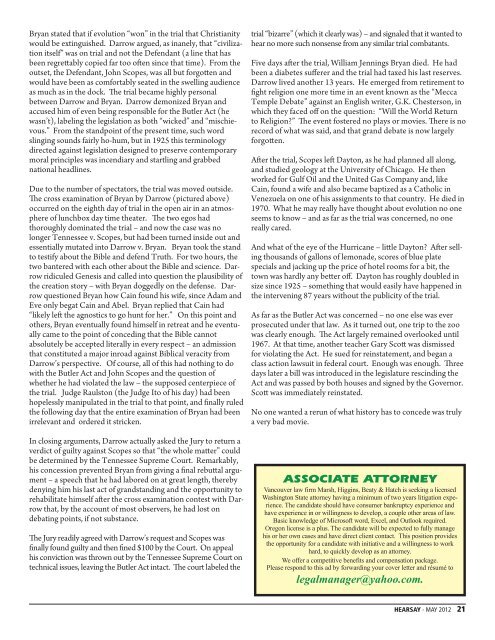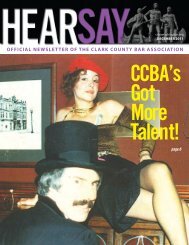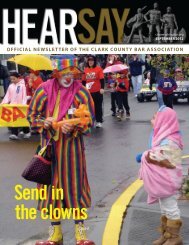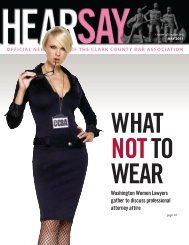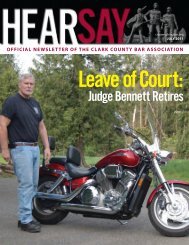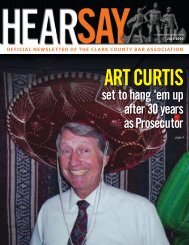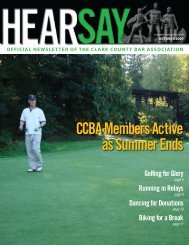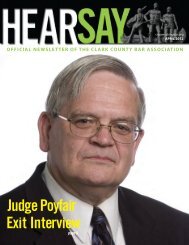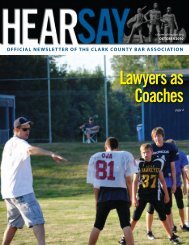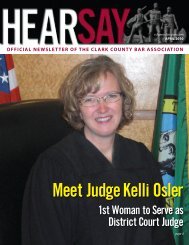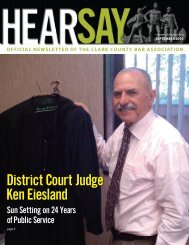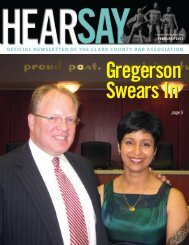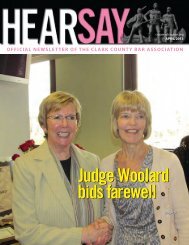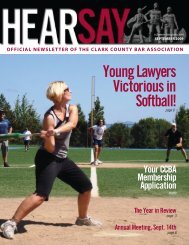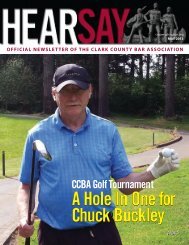CCBA Welcomes Judge Gonzales
CCBA Welcomes Judge Gonzales
CCBA Welcomes Judge Gonzales
Create successful ePaper yourself
Turn your PDF publications into a flip-book with our unique Google optimized e-Paper software.
Bryan stated that if evolution “won” in the trial that Christianity<br />
would be extinguished. Darrow argued, as inanely, that “civilization<br />
itself” was on trial and not the Defendant (a line that has<br />
been regrettably copied far too often since that time). From the<br />
outset, the Defendant, John Scopes, was all but forgotten and<br />
would have been as comfortably seated in the swelling audience<br />
as much as in the dock. The trial became highly personal<br />
between Darrow and Bryan. Darrow demonized Bryan and<br />
accused him of even being responsible for the Butler Act (he<br />
wasn’t), labeling the legislation as both “wicked” and “mischievous.”<br />
From the standpoint of the present time, such word<br />
slinging sounds fairly ho-hum, but in 1925 this terminology<br />
directed against legislation designed to preserve contemporary<br />
moral principles was incendiary and startling and grabbed<br />
national headlines.<br />
Due to the number of spectators, the trial was moved outside.<br />
The cross examination of Bryan by Darrow (pictured above)<br />
occurred on the eighth day of trial in the open air in an atmosphere<br />
of lunchbox day time theater. The two egos had<br />
thoroughly dominated the trial – and now the case was no<br />
longer Tennessee v. Scopes, but had been turned inside out and<br />
essentially mutated into Darrow v. Bryan. Bryan took the stand<br />
to testify about the Bible and defend Truth. For two hours, the<br />
two bantered with each other about the Bible and science. Darrow<br />
ridiculed Genesis and called into question the plausibility of<br />
the creation story – with Bryan doggedly on the defense. Darrow<br />
questioned Bryan how Cain found his wife, since Adam and<br />
Eve only begat Cain and Abel. Bryan replied that Cain had<br />
“likely left the agnostics to go hunt for her.” On this point and<br />
others, Bryan eventually found himself in retreat and he eventually<br />
came to the point of conceding that the Bible cannot<br />
absolutely be accepted literally in every respect – an admission<br />
that constituted a major inroad against Biblical veracity from<br />
Darrow’s perspective. Of course, all of this had nothing to do<br />
with the Butler Act and John Scopes and the question of<br />
whether he had violated the law – the supposed centerpiece of<br />
the trial. <strong>Judge</strong> Raulston (the <strong>Judge</strong> Ito of his day) had been<br />
hopelessly manipulated in the trial to that point, and finally ruled<br />
the following day that the entire examination of Bryan had been<br />
irrelevant and ordered it stricken.<br />
In closing arguments, Darrow actually asked the Jury to return a<br />
verdict of guilty against Scopes so that “the whole matter” could<br />
be determined by the Tennessee Supreme Court. Remarkably,<br />
his concession prevented Bryan from giving a final rebuttal argument<br />
– a speech that he had labored on at great length, thereby<br />
denying him his last act of grandstanding and the opportunity to<br />
rehabilitate himself after the cross examination contest with Darrow<br />
that, by the account of most observers, he had lost on<br />
debating points, if not substance.<br />
The Jury readily agreed with Darrow’s request and Scopes was<br />
finally found guilty and then fined $100 by the Court. On appeal<br />
his conviction was thrown out by the Tennessee Supreme Court on<br />
technical issues, leaving the Butler Act intact. The court labeled the<br />
trial “bizarre” (which it clearly was) – and signaled that it wanted to<br />
hear no more such nonsense from any similar trial combatants.<br />
Five days after the trial, William Jennings Bryan died. He had<br />
been a diabetes sufferer and the trial had taxed his last reserves.<br />
Darrow lived another 13 years. He emerged from retirement to<br />
fight religion one more time in an event known as the “Mecca<br />
Temple Debate” against an English writer, G.K. Chesterson, in<br />
which they faced off on the question: “Will the World Return<br />
to Religion” The event fostered no plays or movies. There is no<br />
record of what was said, and that grand debate is now largely<br />
forgotten.<br />
After the trial, Scopes left Dayton, as he had planned all along,<br />
and studied geology at the University of Chicago. He then<br />
worked for Gulf Oil and the United Gas Company and, like<br />
Cain, found a wife and also became baptized as a Catholic in<br />
Venezuela on one of his assignments to that country. He died in<br />
1970. What he may really have thought about evolution no one<br />
seems to know – and as far as the trial was concerned, no one<br />
really cared.<br />
And what of the eye of the Hurricane – little Dayton After selling<br />
thousands of gallons of lemonade, scores of blue plate<br />
specials and jacking up the price of hotel rooms for a bit, the<br />
town was hardly any better off. Dayton has roughly doubled in<br />
size since 1925 – something that would easily have happened in<br />
the intervening 87 years without the publicity of the trial.<br />
As far as the Butler Act was concerned – no one else was ever<br />
prosecuted under that law. As it turned out, one trip to the zoo<br />
was clearly enough. The Act largely remained overlooked until<br />
1967. At that time, another teacher Gary Scott was dismissed<br />
for violating the Act. He sued for reinstatement, and began a<br />
class action lawsuit in federal court. Enough was enough. Three<br />
days later a bill was introduced in the legislature rescinding the<br />
Act and was passed by both houses and signed by the Governor.<br />
Scott was immediately reinstated.<br />
No one wanted a rerun of what history has to concede was truly<br />
a very bad movie.<br />
ASSOCIATE ATTORNEY<br />
Vancouver law firm Marsh, Higgins, Beaty & Hatch is seeking a licensed<br />
Washington State attorney having a minimum of two years litigation experience.<br />
The candidate should have consumer bankruptcy experience and<br />
have experience in or willingness to develop, a couple other areas of law.<br />
Basic knowledge of Microsoft word, Excel, and Outlook required.<br />
Oregon license is a plus. The candidate will be expected to fully manage<br />
his or her own cases and have direct client contact. This position provides<br />
the opportunity for a candidate with initiative and a willingness to work<br />
hard, to quickly develop as an attorney.<br />
We offer a competitive benefits and compensation package.<br />
Please respond to this ad by forwarding your cover letter and résumé to<br />
legalmanager@yahoo.com.<br />
HEARSAY - MAY 2012 21


